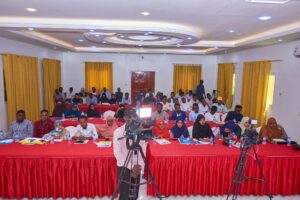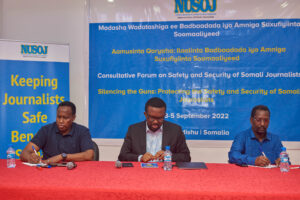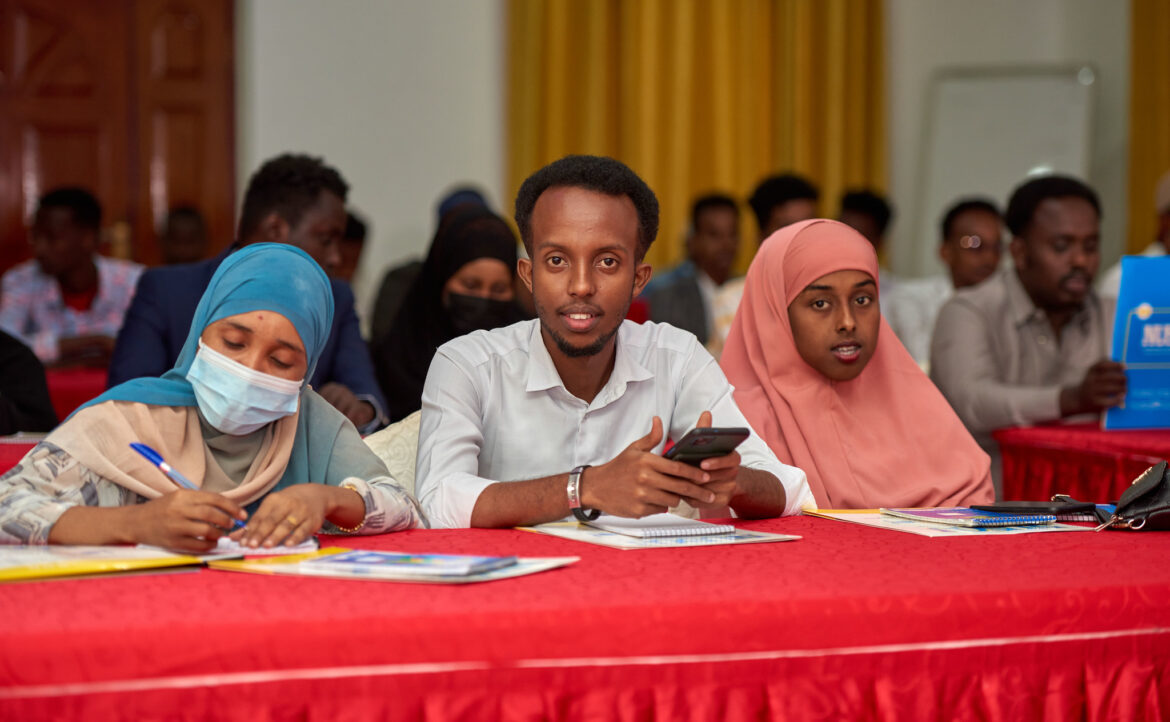Mogadishu, 5 September 2022 – Journalists working in Somalia have adopted a National Action Plan which, among other things, seeks to strengthen the protection and safety of journalists and tame the culture of intimidation, gender-based violence and sexual violence and harassment in the workplace.
The National Action Plan was adopted at the end of a three-day consultative forum organized by the National Union for Somali Journalists (NUSOJ) to discuss ways to create a safe working environment for Somali journalists.
Supported by the African Union Transition Mission in Somalia (ATMIS), the forum drew participants from several media houses in Mogadishu, the Federal Government of Somalia, the United Nations Educational, Scientific and Cultural Organisation (UNESCO) and the International Labour Organisation (ILO).
“Media professionals have always played an important role in early warning, crisis response and post-conflict interventions. They can effectively contribute to conflict prevention, management and resolution,” said the Deputy Special Representative of the Chairperson of the African Union Commission (DSRCC) for Somalia, Ms. Fiona Lortan in her address on the opening day of the forum.

Ms. Lortan said that discussions on the safety and security of journalists in Somalia were in line with the African Union initiative of “Silencing the Guns”, which is based on the political commitment of African Union member states to eradicate the underlying triggers of conflict.
“This places governance at the heart of efforts to address and end conflicts on the continent, and therefore also places the right to information and freedom of expression at the heart of peace and security efforts,” Ms. Lortan added.
Discussions at the forum focused on the UN plan of action on the safety of journalists and the issue of impunity, occupational safety and health of journalists, the African Union legal instruments relating to the protection of journalists, digital security for journalists, and the safety of women in journalism.
Somalia Federal Minister for Internal Security, Dr. Mohamed Ahmed Sheikh Ali (Doodishe), who also addressed the forum, noted that freedom of speech is a prerequisite to peace and that the Federal Government of Somalia was committed to improving the working environment for journalists in Somalia.
“Media freedom is key to a Somalia that is at peace. Our constitution guarantees media freedom and right to expression and safety. Citizens have the right to express their opinions, and to do so responsibly,” said Dr. Mohamed.
For Ms Amal Hassan, a female journalist working in Mogadishu, the forum offered a platform for journalists to speak about challenges they face while performing their duties.
“As female reporters, we face challenges relating to access to news sources. We also find problems when covering public events such as demonstrations. As women, we need to perform our work freely without discrimination, just like our male counterparts,” said Amal.
Other than physical attacks, harassment, unlawful arrests, detentions, torture, cyberbullying and other forms of threats and intimidation, the forum discussed at length the need to create a safe working environment for female journalists in the country.
“Women journalists have unique safety concerns that need to be addressed if the goal of a peaceful Somalia in which all citizens enjoy their rights without obstruction, and without the risk of retribution is to be met,” said Omar Faruk Osman, the NUSOJ Secretary General.
“A special focus of the forum was on finding ways to create a conducive environment for female journalists and eliminating threats such as harassment, physical harm hacking, blackmailing and intimidation which they face on a day-to-day basis,” he added.
The National Action Plan seeks to champion a multi-dimensional approach to the safety of journalists that acknowledges the physical, legal mental, gendered and technological dimensions of violence and the varied ways of harassment against journalists and their impact on the profession.




